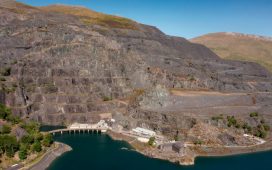Unlock the Editor’s Digest for free
Roula Khalaf, Editor of the FT, selects her favourite stories in this weekly newsletter.
Sumitomo Electric Industries is set to install subsea electricity cables between Shetland and the Scottish mainland, a deal that underpins the Japanese company’s decision to build a cable manufacturing site in the Highlands.
SSEN Transmission, a branch of the electricity infrastructure group SSE, on Tuesday named Sumitomo as the preferred bidder for the proposed Shetland 2 High Voltage Direct Current link subsea cable.
It said it would conclude contractual talks with the Japanese company and Van Oord Offshore Wind UK, Sumitomo Electric’s partner on the project, “in the coming weeks and months”.
The subsea link, part of the National Grid’s network expansion plan for Great Britain, will enable the connection of three offshore wind farm sites adjacent to Shetland and add 1.8GW of wind-generated power to the grid.
That is equivalent to 13 per cent of the UK’s commissioned offshore wind capacity.
“Scotland is fast becoming a renewable energy powerhouse, providing opportunities to grow our economy and create jobs while protecting the environment,” said Màiri McAllan, Scotland’s energy secretary.
The announcement comes a day after the development banks of the UK and Scotland extended £100mn of finance to Ardersier port, which is building an energy transition hub to supply and maintain offshore wind farms from a former oil and gas services site on the Moray Firth.
Upgrading the national electricity grid is a vital component for the development of Britain’s offshore wind industry and a key driver in the pathway to net zero carbon emissions.
The UK plans to develop 50GW of offshore wind capacity by the end of the decade, up from about 14GW at present, as it pursues its 2050 net zero target. Scotland, which manages the leasing of its seabed to wind farm developers and is investing £500mn in offshore wind supply chain, is pushing for a target of 2045.
The devolved government last month ditched Scotland’s 2030 greenhouse gas emissions targets after they were deemed unattainable by the UK climate watchdog.
The climbdown triggered a series of events that led to the end of the power-sharing agreement between the Scottish National party and the Scottish Greens and, ultimately, the resignation of Humza Yousaf as first minister.
Limited grid connections remain high on the list of challenges cited by renewables developers in the UK, who also complain of supply chain bottlenecks and bureaucratic delays in regulatory approvals.
Expansion of the electricity grid is also triggering resistance from residents who, backed by parliamentarians at Holyrood, oppose large pylons snaking across the countryside.
Sumitomo is on Tuesday holding a groundbreaking ceremony at its £350mn cable factory in Nigg on the Cromarty Firth. The site will create hundreds of skilled jobs in an area whose residents are concerned about employment prospects, given the decline in the North Sea oil industry.
Osamu Inoue, president of Sumitomo Electric, said winning preferred bidder status for the Shetland 2 project had enabled this “significant investment” into the UK, which would help establish local supply chains.
Rob McDonald, managing director of SSEN Transmission, said: “This is great news for the Highland economy, helping unleash the economic potential the clean energy transition presents for the north of Scotland.”










